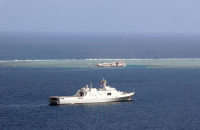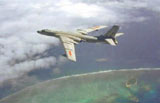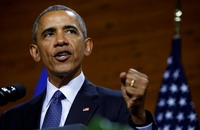THE ruling on an international arbitration case, brought by the Philippines against China on rival claims to the South China Sea, is expected soon.
With the decision widely predicted to favour the Philippines, China – which has refused to participate in the proceedings – has revved up its efforts to influence public opinion at home and abroad.
State-owned media outlets, such as China Radio International’s WeChat account “Watch Asean”, began posting materials provided by the Chinese Foreign Ministry in late April to prove that China lays historical claim to the territory.
Turning to age-old manuscripts like the Book of Han and Record of Foreign Matters written during the Eastern Han Dynasty (25 AD – 220 AD), China said its people were the first to discover, name and administer various South China Sea islands and therefore enjoy priority rights to own and use the features.
“History has irrefutably proved that China is the sole owner of the South China Sea islands,” it said.
China also cited foreign publications, such as The China Sea Directory by United Kingdom’s Hydrographic Office in 1868 and a 1933 French magazine Le Monde Colonial Illustré, as evidence that Chinese fishermen did live on the islands.
As for other South-East Asian nations that border the South China Sea, China claimed they did not challenge its sovereignty until rich deposits of oil and natural gas were discovered there in the 20th century.
“Vietnam, the Philippines, Malaysia, etc, then ‘occupied’ parts of Nansha (Spratly Islands) and hence the territorial spat ensued,” said Li Guoqing, research fellow of the Institute of Chinese Borderland Studies of the Chinese Academy of Social Sciences told local and international journalists in Beijing.
The conflicts brewed for decades and heightened over the past two years with China’s massive expansion and construction activities in the area, adding airfields, ports and lighthouses to seven islands and reefs.
Its explanation that these facilities were intended for civilian use was not too convincing, especially for the United States, which criticised China for “militarising” the disputed waters.
On the international front, China appeared as an aggressive claimant who insists that historical evidence can substantiate its assertion over the territory.
It uses the “nine-dash line” to demarcate its boundary on maps, covering most of the South China Sea and overlapping the exclusive economic zones (EEZ) of Malaysia, Brunei, Vietnam, the Philippines and Indonesia.
If China is so confident of its sovereignty over the South China Sea, why is it reluctant to appear before the Permanent Court of Arbitration in The Hague?
China said territorial sovereignty is beyond the purview of the United Nations Convention on the Law of the Sea (UNCLOS).
It added that both countries have agreed in the Declaration on the Conduct of Parties in the South China Sea (DOC) to settle disputes through bilateral channels, which means the Philippines’ arbitration has thus breached its obligation under international law.
But the Philippines has emphasised to the five-person tribunal that it is not asking for a ruling on territorial sovereignty, but to clarify its maritime entitlements in the South China Sea.
The tribunal decided in October last year that it has the authority to consider the Philippines’ submissions, adding that the DOC was only a political agreement, which is not legally binding.
The tribunal will rule on whether China’s “nine-dash line” violates UNCLOS, whether the maritime features claimed by both parties should be characterised as “islands, rocks, low-tide elevations or submerged banks” (to determine the maritime zones they are entitled to), and whether “certain Chinese activities” in the South China Sea have violated UNCLOS.
China is adamant that it would not entertain the decision.
“No matter what verdict the arbitration case will be, it is unlawful and invalid. China will neither accept nor recognise it,” Ouyang Yujing, director-general of the Department of Boundary and Ocean Affairs of the Chinese Foreign Ministry, said in a press conference in early May.
Li said it is foreseeable that the disputes over the South China Sea would continue to exist for a long time after the verdict is delivered.
He downplayed the significance of the arbitration, saying that it has been hyped up to appear as if it could “change the world”.
“While China is the most experienced country in the world in solving boundary disputes (through bilateral negotiations), it is also the least experienced when it comes to dealing with territorial claims through international arbitration, so I think China has made the right decision to stay away from the arbitration,” he said.
As China slammed countries outside of the region, such as the US and Japan, for meddling in the maritime row, it is actively lobbying for international support on its stance.
Chinese Foreign Minister Wang Yi, during his three-nation visit to South-East Asia in April, said that Brunei, Cambodia and Laos reached a consensus with China to, among others, agree that countries can choose their own ways to solve disputes and oppose unilateral attempts to impose an agenda on others.
National news agency Xinhua reported that Fiji supported China’s position in a meeting between their foreign ministers in Beijing last month (although the Fijian government quickly clarified that it did not, according to the Fiji Broadcasting Corporation).
Last week, a Doha Declaration was signed by China and 21 countries of the Arab League to support peaceful settlement of disputes through negotiation.
Chinese Foreign Ministry spokesperson Lu Kang said that Gabon, Mauritania and Venezuela have also voiced their support for China.
“We highly commend these countries and regional organisations for their calling for justice,” he said in a daily press briefing.
 Judging from China’s behaviour, it is very likely that it will follow up with another publicity blitz to denounce the tribunal’s verdict, if the latter does indeed rule in favour of the Philippines.
Judging from China’s behaviour, it is very likely that it will follow up with another publicity blitz to denounce the tribunal’s verdict, if the latter does indeed rule in favour of the Philippines.The disputes, meanwhile, will be far from over.
By Tho Xin Yi
Check-in China
Related:

Manila's move shows it is the real provocateur
China has always opposed the Philippines for its illegal occupation of its islands, and any construction projects on them will not consolidate Manila's illegal claim to sovereignty.China’s rejection of South China Sea arbitration is reasonable
The Hague-based arbitration tribunal will soon announce the final results of its arbitration on the [Read it]
Hague-based arbitration panel oversteps in the South China Sea issue
As a founder, vindicator and constructor of the international law that is now being violated, China [Read it]
Western speculation will never shake China’s determination in the South China Sea
In recent days, more than 10 countries have shown their support for China’s proposition of peaceful [Read it]
China's stance on S.C. Sea arbitration is to defend rather than disobey int'l law
BEIJING, May 13 -- China's position of neither participating in nor accepting the results of the for [Read it]

US military snooping is more than impolite
[2016-05-20 07:02] To peep into other's courtyard uninvited is at best impolite; to criticize the host for objecting to such behavior compounds the injury.Pentagon raises risk of midair collision over South China Sea
Once the tensions are lit up, both sides will have to raise the stakes and the situation could spiral out of control at anytime.Source: Global Times | 2016-5-19 20:40:13

US economic hegemony against world reality
[2016-05-05 07:35] The balanced and sustainable development of the global economy depends on a more equal and fair world economic order, which requires the participation of all major economies in its governance, not just the developed nations.Related posts:
Philippine presidential election a chance to settle South China Sea ...
Mar 9, 2016 ... China was the earliest to explore, name, develop and administer various South
China sea islands. Our ancestors worked diligently here for...
Nov 4, 2015 ... If such provocations continue, China's warships will have to engage in more face-
offs with their US counterparts in the South China Sea. Beijing...
Jul 23, 2015 ... Sophisticated diplomacy needed to tackle challenges in South China Sea
Philippine President Benigno Aquino III will seek the congressional ...
Nov 18, 2015 ... The suspense is to what extent the US will foist the South China Sea disputes
into this economic and trade meeting. Manila has made clear that ...


 Illustration: Liu Rui/GT
Illustration: Liu Rui/GT


 A formation of the Nanhai Fleet of China's Navy on Saturday finished a three-day patrol of the Nansha islands in the South China Sea.
A formation of the Nanhai Fleet of China's Navy on Saturday finished a three-day patrol of the Nansha islands in the South China Sea.







